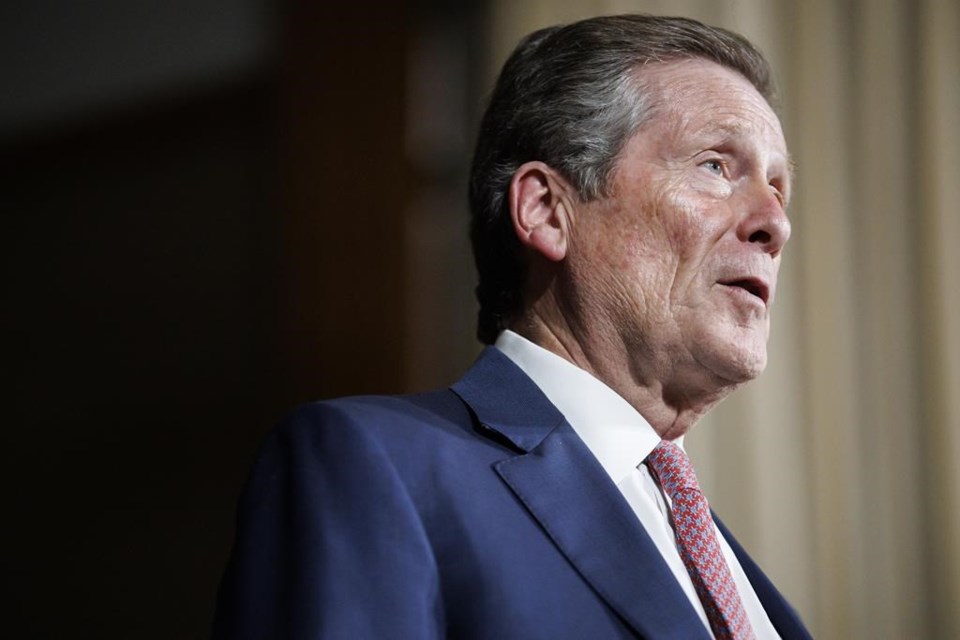TORONTO — Ontario plans to bring in a so-called "strong mayor" system for Toronto and Ottawa – and is considering expanding that to other cities – as it looks to put more power into the hands of major municipal leaders.
Premier Doug Ford said Wednesday that his Progressive Conservative government is aiming to have such a system in place before municipal elections planned for October.
"I just think that the mayor of Toronto or Ottawa, or any mayor, they’re accountable for everything but they have the same single vote as a single councillor," Ford told reporters outside the legislature.
"We'll get into the details later ... it'll be immediate as we move forward in the election in October."
Ford said two thirds of a council would be able to overrule a mayor under such a system.
Municipal Affairs and Housing Minister Steve Clark said the province is "still consulting" on whether to expand a "strong mayor" system beyond Toronto and Ottawa to other urban centres.
"We want to put a plan in place. As the premier has said it takes effect for this municipal election," he said.
"We’ve got a bit of time but the premier and I are both of the same mind. We need to make sure that especially in major cities that those mayors and those councils have the tools they need."
The U.S.-style "strong mayor" system is typically marked by the centralization of executive power with the mayor, who has control over department head appointments, oversees budgets, and sometimes is granted veto power.
The Opposition New Democrats questioned the timing of such a move and said putting in such a system was the "wrong priority."
"Why did Premier Doug Ford keep his strong mayor plan secret throughout the campaign? Why won’t he consult municipalities or the people they represent?" NDP municipal affairs critic Jeff Burch wrote in a statement.
Toronto Mayor John Tory, who is seeking re-election, signaled his support for such a system, saying he had previously said he was in favour of a "strong mayor" structure as well.
"I understand this is something that the province is exploring in order to get more homes built as quickly as possible," he wrote in a statement. "As mayor, I am absolutely determined to get more housing built – no matter what powers I have as mayor."
A spokesperson for Ottawa Mayor Jim Watson said the mayor was on annual leave and would not be able to comment Wednesday. Watson has said he's not seeking re-election.
The mayor of Mississauga, Ont., said she's interested in learning more about the proposed changes and how they will be put into effect in Ottawa and Toronto.
"My desire would, of course, be to continue the consensus building that Mississauga council has a long history of doing on a wide variety of issues, with any special powers being reserved for cases where decisive action is needed," Bonnie Crombie wrote in a statement.
Crombie said she has asked the premier that big cities such as Mississauga be a part of the conversation on the issue moving forward.
A spokesperson for Patrick Brown, the mayor of nearby Brampton, Ont., said Brown was not consulted on the matter, but "welcomes the discussion."
"If Toronto and Ottawa receive new powers, he hopes other large municipalities would be considered," Gary Collins said in an email.
Both Crombie and Brown are seeking re-election this fall.
Some councillors in Toronto and Ottawa spoke out against the planned provincial move.
Ottawa mayoral candidate and Coun. Catherine McKenney, in a tweet, called the proposal an “anti-democratic move” that would strip decision-making power from residents and their council representative.
In Toronto, Coun. Mike Layton said the issue was not about Tory, about political leaning, or about efficiency.
"It’s about what could happen if this power fell into the wrong hands, regardless of your political stripe," he tweeted Wednesday.
City councils in Ontario have a tradition of issue-by-issue coalition building, said Western University associate professor Zach Taylor, who specializes in urban politics and local government. Mayors can appoint committee chairs, but otherwise they have one vote along with the rest of council.
"If you don't have to use soft power to build coalitions because you can just wave magic wands, you’re not going to put effort into building those coalitions. I think that’s the main argument against," Taylor said.
On the other hand, Taylor said, it’s possible a "strong mayor" system could lead to quicker decision-making.
It's unclear, however, how such a system would help to significantly ease the housing crisis, given the power the province wields in planning decisions, Taylor said.
Ford's intention to legislate expanded mayoral powers, first reported by the Toronto Star, comes ahead of Ontario municipal elections set for Oct. 24.
In 2018, Ford slashed the size of Toronto's city council nearly in half during the municipal election campaign.
This report by The Canadian Press was first published July 20, 2022.
The Canadian Press
